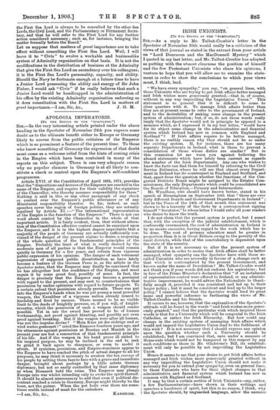APOLOGIA IMPERATORIS.
[To Tea BDITOIL Or T II EC " SPILCRATOR."1
Sin,—In the very interesting article printed under the above
beading in the Spectator of November 24th you express some doubt as to the ultimate benefit either to Europe or Germany
likely to accrue from the public criticism of the Emperor which is so prominent a feature of the present time. To those who know something of Germany the expression of that doubt must come as a welcome relief from the hints of coming crisis in the Empire which have been contained in many of the reports on this subject. There is one very adequate reason why no popular clamour in Germany is at all likely to con- stitute a check or control upon the Emperor's self-confident programme.
Article XVII. of the Constitution of April 16th, 1871, provides that the dispositions and decrees of the Emperor are enacted in the name of the Empire, and require for their validity the signature of the Chancellor, who thereby assumes responsibility for them." Nothing is said in this or any other paragraph of any check or control over the Emperor's public utterances or of any Ministerial responsibility therefor. So far, indeed, as such speeches cover the region of foreign politics, they are actually legalised by Article XI. :—" The international representation of the Empire is the function of the Emperor." There is not one word about control by the Chancellor in the whole of that important article. It is fairly evident, then, that without altera- tion of the Constitution effective control cannot be exercised upon the Emperor, and it is in the highest degree improbable that a majority of the people of Germany are actually sufficiently con- vinced of the danger of the present regime to desire a reopening of the whole question of the fundamental principles of the Empire. Probably the limit of what is really desired by the moderate men of all parties is that the Emperor would remain quietly in Germany for a few years, and refrain from vigorous public expression of his opinions. The danger of such vehement expressions of supposed public dissatisfaction as have lately become a feature of the German Press is, as the article in the Spectator notes, that the Emperor may finally be convinced that he has altogether lost the confidence of the Empire, and must regain it by some great feat, possibly of arms. In fact, the danger is precisely that the Emperor may become a pessimist with regard to the present, and may seek to counterbalance that pessimism by undue optimism with regard to future projects. To a certain extent that pessimism already prevails. There was put into the Emperor's hands when he was yet young a most powerful weapon, the Excalibur of a vigorous nation already inured to hardship and fired by success. There seemed to be no visible limit to the deeds of knightly prowess, or, if you will, of knight- errantry, which the possession of such a weapon should render possible. Yet in use the sword has proved to be of human workmanship, not proof against blunting, and possibly not even proof against breaking. But if the weapon were after all human, was not the impulse divine ? "Mein Kura 1st der richtige und er wird weit,er geoteuert !" cried the Emperor fourteen years ago, and his utterances against pessimism at Breslau and Munich in the present year are but a reassertion of that fundamental principle of his life. And if the weapon in his hand prove ill suited to his inspired purpose, he may be inclined in the end to seek to grind it back again to sharpness, or even to model it .Eafreosh. inIftocwyniarciswmhi,lsptesinsinitenisamin,ganodniyEtompei the Emperor to have reached the pitch of actuaeltahdareinnsepgseistirattoptPelacillrhit:s. purposes, he may think it necessary to awaken the bon courage of his people by setting them face to face with a grave and immediate danger, brought about perhaps by a little astute German - diplomacy, but not so easily controlled by that same diplomacy as when Bismarck held the reins. The Emperor may plunge evoke Empire-weariness
It should be almost unnecessary to add that even if political dis- content reached a crisis in Germany, Europe might thereby be the loser, not the gainer. When the pot boils over there are some- times scalds instead of meat for the onlookers.






























































 Previous page
Previous page